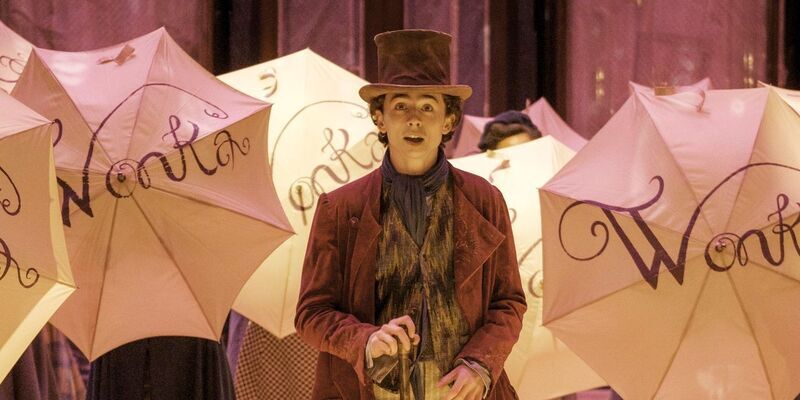
Review by
Eric Hillis
Directed by: Paul King
Starring: Timothée Chalamet, Hugh Grant, Olivia Colman, Calah Lane, Keegan-Michael Key, Paterson Joseph, Matt
Lucas, Mathew Baynton, Sally Hawkins, Rowan Atkinson

If 1971's Willy Wonka and the Chocolate Factory is a
scrumdidilyumptious slab of Belgian chocolate, Wonka is a
piece of pre-chewed gum found under a school desk. Sure, there's still a bit
of flavour left, but it quickly loses its appeal once you realise it's a
futile attempt to recreate a taste sensation that has thrilled generations
of kids of all ages.
Wonka is that scourge of 21st century Hollywood, the origin
story. Given how we find Willy Wonka living a misanthropic reclusive life in
the '71 film, any prequel should be along the lines of the
Star Wars prequels, with the young optimistic Wonka having his
spirit broken by experiencing humanity at its worst. But you can't really
expect that from Paul King, the director of the
Paddington films. King takes the template that worked so well
for those movies and attempts to shoehorn a Wonka origin story, but it's an
ill fit. Remember when the first images of Paddington were
revealed and the internet remarked how it looked like a horror movie? Well
that's the movie we should really get if we purchase a golden ticket for a
Wonka prequel. The '71 film is one of the most charming kids' movies of all
time, but it also terrified everyone who watched it at a young enough age
(that poor chicken). Horror movies like the
Saw
and
Escape Room
franchises and
The Menu
have far more in common with Mel Stuart's film than King's prequel does. In
the '71 film Wonka is essentially an evil genius who lures kids to his
nightmarish chocolate factory and picks them off one by one in wildly
inventive ways. There's no horror here, and no invention either.

You might ask why I keep comparing Wonka to the '71 film. Isn't this just a
prequel to Roald Dahl's original novel. Well no, it's not.
Wonka features Leslie Bricusse and
Anthony Newley's original score, as it desperately tries to ride the
coattails of a classic. But that's where the similarities end.
This story sees Wonka (Timothee Chalamet) arrive in an alternate
version of Paris where all the locals have been replaced by Brits and
Americans. A genius when it comes to chocolate, Wonka dreams of opening a
factory in the city, but in a riff on that classic Groucho Marx first date
routine, his handful of sovereigns is quickly whittled down. Wonka takes a
room in a boarding house run by Mrs Scrubbit (Olivia Colman), who
dupes him into a life working in her washroom to pay off his debt. This is
posited as a terrible fate, but many people would gladly work a menial day
job if they got to live in central Paris.

Teaming up with Noodle (Calah Lane), one of those classic kids'
movie orphans who looks like she never experienced a tough day in her short
life, Wonka hatches a plan to flee the washroom and follow his dreams. Some
early charm, courtesy of Chalamet and some 52 year-old 'memberberries, gives
way to a convoluted plot involving an alliance between the Catholic church
(no, I'm serious) and some rival chocolatiers. It all builds up to one of
those over-egged action movie climaxes that have been causing cinemagoers to
check their watches ever since Marvel set the tone for today's risk-averse,
innovation-free blockbusters back in the late noughties.
Hugh Grant provides some campy highlights as an Oompa-Loompa, now
shrunken to less than a foot tall to avoid any awkward debate about whether
the role should have gone to a little person (i.e. Peter Dinklage), but the
lame script never plays to his comic strengths. Chalamet understands the
brief and is a ray of sunshine, but most of the supporting cast give the
sort of mugging performances you expect of a struggling former soap star
begrudgingly appearing in panto at Cleethorpes.

Wonka is very much a musical, with a number practically every
10 minutes. Well, "number" is a stretch, as there's no dancing on display,
just a lot of prancing about. The lyrics by Neil Hannon of The Divine
Comedy are embarrassingly awful, as Hannon seems to think his brief was to
rhyme as many words with "chocolate" as possible. The trouble with modern
musicals is that the songs are written to fit the narrative, and they too
often serve merely as replacements for dialogue. The best musicals start
with the numbers and build a narrative around them, which is why so many
musical songs went on to become jazz standards. It's impossible to imagine
John Coltrane covering any of the pitiful offerings from the
Wonka songbook. After forcing us to suffer through its
numbingly bad original songs, Wonka finally gives in and
breaks out the classic 'Pure Imagination' near the end in a desperate
attempt to send us home happy. It's all a bit like a Bob Dylan concert in
1990 where he insists on performing Under the Red Sky in its entirety before
giving in and encoring with Tangled Up In Blue.


